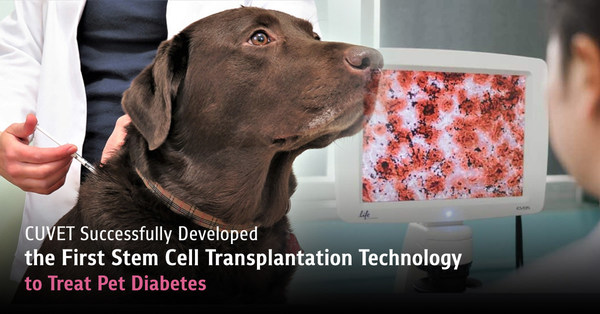BANGKOK, Dec. 2, 2022 /PRNewswire/ — For the first time in Thailand, a research team from Chula’s Faculty of Veterinary Science (CUVET) is the first to have successfully developed a method to culture dog pancreatic cells from stem cells and cell transplantation technology. They aim to test the method in the lab and sick animals suffering from diabetes.
Diabetes affects not only humans but also our pets with as many as 5-10 % of the cases found in cats as well as dogs. Treatment with insulin injections is still not very effective. For this reason, a research team from Chula’s Faculty of Veterinary Science has collaborated with Bio ink Co., Ltd., one of Chula’s spin-off companies, to develop a method for pancreatic cell culture from stem cells and cell transplantation technology for the first time in Thailand.
"Diabetes in humans and pets share some similarities though the knowledge on the treatment is far apart. Using stem cells and advanced forms of technology to treat diabetes in human beings has become a trend, so we try to apply this technology to animal treatment as well," Assistant Professor Dr. Chenpop Sawangmek, Department of Veterinary Pharmacology Science, Faculty of Veterinary Science, Chulalongkorn University and co-founder of Bio ink Co., Ltd. described the motivation that led to this project.
"Diabetes is a chronic disease and complications can be fatal to our pets. The inability to control sugar levels can also cause the deterioration of various organs in the body. This is a cause of much suffering for the pets as well as their owners, not to mention the financial burden."
Stem cell innovation in the treatment of diabetes in animals
According to Assistant Professor Dr. Chenpop, the type of diabetes mostly found in dogs is type 1 diabetes where the body lacks beta-cells to create insulin resulting in insulin deprivation in their bodies. For type 2 diabetes, mostly found in cats, the body still has beta-cells but there is a deficiency in insulin secretion or insulin resistance. Treatment for the two types of diabetes is therefore different.
Dr. Sirirat Nantavisai and Dr. Watchareewan Rodprasert co-founders of Bio Ink Co. Ltd. enumerated that for this research, the Veterinary Stem Cell and Bioengineering Innovation Center (VSCBIC), a research unit of CUVET, and Bio Ink Co, Ltd. focused primarily on the type 1 diabetes in dogs as the currently used insulin injections treatment for dogs is not very effective.
"During the research process, we will create dog’s pancreatic cells which one might call insulin-producing cells (IPCs) derived from canine mesenchymal stem cells (cMSCs) while developing transplantation technology to use in replacing pancreatic cells that have been damaged or destroyed. The cells that have been produced can efficiently create and secrete insulin."
Dr. Watchareewan further explained that when used along with the double encapsulation transplantation technology, this method produces strong cells and prevents them from damage and deterioration while also preventing rejection from the immune system.
Stem cells and the hope for treating diseases in human beings and animals
At present, the research team has developed canine cell tissue for stem cell extraction and multiplication. It has also been successful in creating the process of inducting cells along with transplantation technology. This platform has been successful and is now ready to be tested for its efficiency and safety in both lab and sick animals. It is estimated that within 3 years it can be used as an actual form of treatment in animals.
"Stem cells can be adapted for use in various ways. If we can successfully develop cells from stem cells, in the future all organs can be directly replaced by cells or tissues. We are studying these options along with creating prosthetic bones to replace damaged bones or accelerate their repair along with producing eye cornea which is a collaborative research project between the faculties of Medicine and Engineering," said Assistant Dr. Chenpop.
Plans for producing medical products from stem cells
With knowledge in bioengineering and stem cell technology, the Faculty of Veterinary Science VSCBIC research unit and Bio Ink Co. Ltd. now have plans to develop stem cell products like cell therapy and stem-cell-derived products to treat pets soon. One example is the exosome product that can be used for sick pets or administered to damaged organs for rehabilitation and repair. It can also be adapted to treat such diseases as cancer, liver or kidney disease, and diseases stemming from organ deterioration, infections, or illnesses related to the immune system. The products are expected to be tested on lab animals within the year and in no more than two years will be offering them commercially.
For those interested kindly contact https://www.cuvscbic.com/.
For the full release and more images, please visit: https://www.chula.ac.th/en/highlight/92729/
About Chulalongkorn University
Chulalongkorn University sets the standard as a university of innovations for society and is listed in the World’s Top 100 Universities for Academic Reputation, in the Quacquarelli Symonds (QS) World University Rankings 2021.
***********************
If you would like more information about this topic, please contact Miss Thanita Wangvanichapan at (+66) 2218 3280 or email thanita.w@chula.ac.th
***********************


